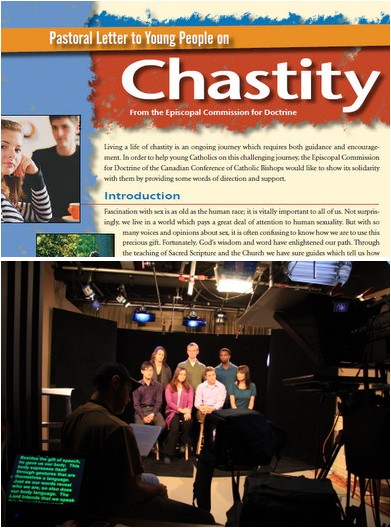

Thinking About Chastity
Deacon Pedro
Tuesday, January 25, 2011
 I think a lot of young people feel this way: being married and then getting a divorce constitutes a failure; merely living together, albeit in a committed, long-term and loving relationship, and then breaking up, is not. So they end up in relationships, living together, outside of marriage.
There is so much confusion regarding marriage, sex and relationships. As a response to some of this confusion and the trends we see in our culture, the Commission for Doctrine of the Canadian Conference of Catholic Bishops released today a pastoral letter to young people on chastity.
“Chastity is a very real challenge, particularly for young people in our country today. We want to encourage those young people who are struggling to live a life of chastity that their bishops stand prayerfully with them and are there to support and encourage them,” says Commission Chairman Archbishop J. Michael Miller, CSB of Vancouver. “I am certain that young people striving to be faithful to the Gospel are not afraid of a challenging and authentic love. It is the only kind that ultimately gives true joy!”
According to the letter, chastity is an offering of oneself in response to God’s gift in Jesus Christ. This echoes the words of Pope Benedict XVI at his papal inauguration:
I think a lot of young people feel this way: being married and then getting a divorce constitutes a failure; merely living together, albeit in a committed, long-term and loving relationship, and then breaking up, is not. So they end up in relationships, living together, outside of marriage.
There is so much confusion regarding marriage, sex and relationships. As a response to some of this confusion and the trends we see in our culture, the Commission for Doctrine of the Canadian Conference of Catholic Bishops released today a pastoral letter to young people on chastity.
“Chastity is a very real challenge, particularly for young people in our country today. We want to encourage those young people who are struggling to live a life of chastity that their bishops stand prayerfully with them and are there to support and encourage them,” says Commission Chairman Archbishop J. Michael Miller, CSB of Vancouver. “I am certain that young people striving to be faithful to the Gospel are not afraid of a challenging and authentic love. It is the only kind that ultimately gives true joy!”
According to the letter, chastity is an offering of oneself in response to God’s gift in Jesus Christ. This echoes the words of Pope Benedict XVI at his papal inauguration:
If we let Christ into our lives, we lose nothing, nothing, absolutely nothing of what makes life free, beautiful and great. ...I say to you, dear young people: Do not be afraid of Christ! He takes nothing away, and he gives you everything. When we give ourselves to him, we receive a hundredfold in return.The launch of the pastoral letter was assisted by Salt + Light Television. We gathered seven young adults to help us deliver the letter in video form. The letter can be downloaded for free at www.cccb.ca. Printed copies can be ordered from the CCCB Publications service at www.cccbpublications.ca. The video production can be viewed on our YouTube channel. It will also be available as a DVD that can be used in the classroom or with youth or young adult groups. You can also watch the full video tonight, following our daily Perspectives Update, at 7:05 and 11:05pm ET; 8:05pm PT. And next week, tune in for a more in-depth look at chastity on Perspectives: The Weekly Edition.
Related Articles:
Category: General Posts
Tag: Bishops, Canada, Canadian Church, CCCB, chastity, Pedro Guevara Mann, Perspectives, sex
Pray with the Pope Reflection – June 2025
Friday, June 13, 2025
 Fr. Edmund Lo, SJ
Fr. Edmund Lo, SJ
In this month of June, the Holy Father invites us to pray that the world might grow in compassion, that each one of us might find consolation in a personal relationship with Jesus, and from his Heart, learn to have compassion on the world.
Chaplaincy: “Divine Coffee” for Students
Tuesday, June 10, 2025
 Gianpaolo Capozzi
Gianpaolo Capozzi
Gianpaolo gives us a behind the scenes look at his upcoming Behold segment on the York University Catholic Chaplaincy.
Pope Leo XIV’s homily for Pentecost Sunday 2025
Sunday, June 8, 2025
 Pope Leo XIV
Pope Leo XIV
On Sunday, June 8, 2025, Pope Leo XIV celebrated Mass for the Jubilee of Movements, Associations, and New Communities and spoke about how the Holy Spirit helps the apostles overcome "their fear, shatters their inner chains, heals their wounds, anoints them with strength and grants them the courage to go out to all and to proclaim God’s mighty works."
Homily of Pope Leo XIV at the Mass for the Jubilee of Families, Children, Grandparents, and the Elderly
Sunday, June 1, 2025
 Pope Leo XIV
Pope Leo XIV
Pope Leo XIV celebrated Mass for the Jubilee of Families, Children, Grandparents, and the Elderly and referred to Pope Francis and mentioned spouses who have been beatified and canonized, like the parents of St. Therese of the Child Jesus.
Looking back on Rerum Novarum
Monday, May 26, 2025
 Matthew Neugebauer
Matthew Neugebauer
Pope Leo XIV chose his name primarily to highlight his most recent namesake Leo XIII, whose "historic encyclical Rerum Novarum addressed the social question" to the challenges of his time. What concerns does the encyclical address? How does it speak to its time? And what has been its legacy 134 years later?
SUPPORT LABEL
$50
$100
$150
$250
OTHER AMOUNT
DONATE










